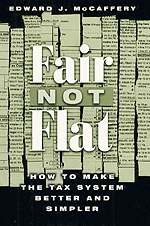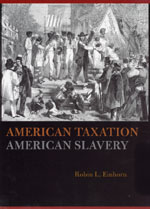The Taxman Cometh
It’s April 15. Do you know where your tax return is? If it’s still in your to-do pile, we recommend sharpening your pencils, preparing a stiff drink, and researching local post office branches with extended hours. If you’ve already filed, we suggest you kick back with this Tax Day reading list, stiff drink (with celebratory cocktail umbrella) optional.
 As Benjamin Franklin famously observed, “In this world nothing can be said to be certain, except death and taxes.” But if you want to get the scoop on the second most famous quote about taxes (later parodied by Dana Carvey on Saturday Night Live), you should read Jan R. Van Meter’s lips. In this addenda to his book Tippecanoe and Tyler, Too: Famous Slogans and Catchphrases in American History, he expounds upon W’s dad’s famous 1988 pledge:
As Benjamin Franklin famously observed, “In this world nothing can be said to be certain, except death and taxes.” But if you want to get the scoop on the second most famous quote about taxes (later parodied by Dana Carvey on Saturday Night Live), you should read Jan R. Van Meter’s lips. In this addenda to his book Tippecanoe and Tyler, Too: Famous Slogans and Catchphrases in American History, he expounds upon W’s dad’s famous 1988 pledge:
George Herbert Walker Bush needed to prove he was tough, tough enough to win the presidential election against the Democrat Michael Dukakis, tough enough to continue the legacy of the outgoing president Ronald Reagan, tough enough to erase his lingering reputation as an effete aristocrat and long-time government insider.
The Bush campaign staff wanted to demonstrate his toughness, his devotion to the Reagan ideals, and his strong conservative convictions. And so, in his acceptance speech to the GOP Convention, Bush stared directly into the lens of the television cameras and grimly said:
My opponent won’t rule out raising taxes. But I will. And the Congress will push me to raise taxes and I’ll say no. and they’ll push, and I’ll say no, and they’ll push again, and I’ll say to them, “Read my lips: no new taxes.”
Bush was elected, but less than two years later, with the federal deficit reaching record levels, Bush was forced to raise some taxes as well as cut spending. He was never forgiven by his own party’s conservatives or by the media. Though Bush’s approval ratings with the public improved following the first Gulf War, his slogan became a byword for political untrustworthiness.
 If the thought of paying taxes makes you anxious to summon your militia, secede from the US, and form an agrarian nation deep in the north woods, perhaps there is a better option: don’t leave the system, change the system. After all, everyone knows that the current tax system is unfair. Some of the richest people in America pay no tax, while a huge share of the tax burden falls on the rest of us. A mere glance at the tax code confirms that it is far too complex, with volumes of rules that no ordinary person could possibly comprehend. What is to be done? Some conservatives have called for a so-called flat tax. But a flat tax is not necessarily a simple tax, and “flat” means “more” for most taxpayers: a rise in middle-class taxes to finance tax cuts for the rich. In clear, easy-to-understand language, Edward J. McCaffery proposes a straightforward and fair alternative. Simpler, more efficient, fairer, and more reflective of America’s current social values, McCaffery’s “fair not flat” tax could help get us out of the tax mess that politicians and special interests have gotten us into, improving the whole country in the process.
If the thought of paying taxes makes you anxious to summon your militia, secede from the US, and form an agrarian nation deep in the north woods, perhaps there is a better option: don’t leave the system, change the system. After all, everyone knows that the current tax system is unfair. Some of the richest people in America pay no tax, while a huge share of the tax burden falls on the rest of us. A mere glance at the tax code confirms that it is far too complex, with volumes of rules that no ordinary person could possibly comprehend. What is to be done? Some conservatives have called for a so-called flat tax. But a flat tax is not necessarily a simple tax, and “flat” means “more” for most taxpayers: a rise in middle-class taxes to finance tax cuts for the rich. In clear, easy-to-understand language, Edward J. McCaffery proposes a straightforward and fair alternative. Simpler, more efficient, fairer, and more reflective of America’s current social values, McCaffery’s “fair not flat” tax could help get us out of the tax mess that politicians and special interests have gotten us into, improving the whole country in the process.
For more from McCaffery, read an interview with the author here. And check out his earlier book on gender biases in current tax structures, Taxing Women.
 Sure, the hassle of paying taxes and the headaches induced by arcane language on the forms are more than enough to put most Americans off from careers in accounting. But, looking deeper, most Americans would probably concede that our distaste for taxes is rooted in our distrust of government. This aversion has a long history. In Robin L. Einhorn’s history of tax policy and debates about slavery, she finds that our attitudes towards taxation have more to do with the history of American slavery than the history of American freedom. American Taxation, American Slavery shows the deep, broad, and continuous influence of slavery on ideas in American politics. She argues that heated battles over taxation, the power to tax, and the distribution of tax burdens were rooted not in debates over personal liberty but rather in the rights of slaveholders to hold human beings as property.
Sure, the hassle of paying taxes and the headaches induced by arcane language on the forms are more than enough to put most Americans off from careers in accounting. But, looking deeper, most Americans would probably concede that our distaste for taxes is rooted in our distrust of government. This aversion has a long history. In Robin L. Einhorn’s history of tax policy and debates about slavery, she finds that our attitudes towards taxation have more to do with the history of American slavery than the history of American freedom. American Taxation, American Slavery shows the deep, broad, and continuous influence of slavery on ideas in American politics. She argues that heated battles over taxation, the power to tax, and the distribution of tax burdens were rooted not in debates over personal liberty but rather in the rights of slaveholders to hold human beings as property.
For more, read Einhorn’s essay about the tax aversion and the legacy of slavery here.
Wishing everyone many happy and sizable returns! (Get it? Returns? Thanks, I’m here Mondays and Wednesdays. Don’t forget to tip your bartender.)